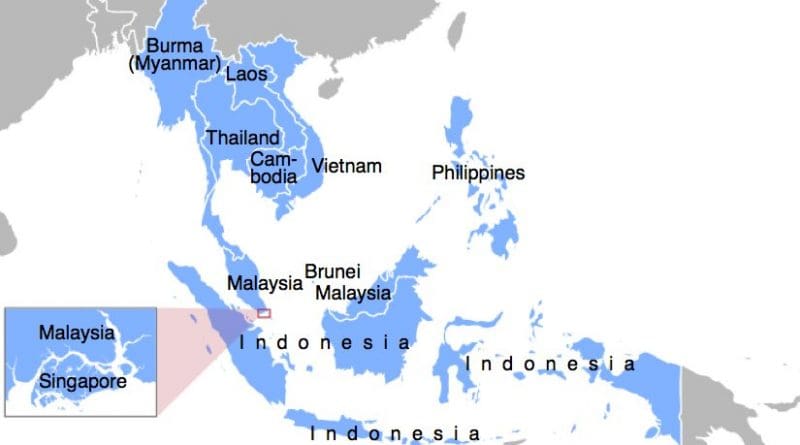The Korea Crisis: Time For ASEAN To Play A Role – Analysis
By RSIS
Notwithstanding its institutional weaknesses, ASEAN is in a unique position to play a role in the brewing crisis in North Korea by bringing conflicting parties back to the negotiating table.
By Richard Javad Heydarian*
ASEAN has often come under criticism for its supposed muted response to major crises in its own backyard. From the Rohingya humanitarian tragedy in Myanmar to the brewing maritime disputes in the South China Sea, the regional body has struggled to muster a robust response.
Yet, the Korean Peninsula presents ASEAN a unique opportunity for redemption. As the purported driver of pan-regional integration in East Asia, the regional organisation provides a unique platform for reviving dialogue and peaceful negotiations among disputing parties.
An Indispensable Player
Crucially, the collapse of the Six Party Talks in 2009 has left the ASEAN Regional Forum (ARF) as the sole mechanism for institutionalised diplomatic interaction among all concerned parties, ranging from Seoul and Beijing to Washington, Tokyo and Pyongyang. By and large, North Korea has displayed an unusual commitment to engaging the world through the regional body by sending high-level delegation to ASEAN meetings.
In August, North Korean Foreign Minister Ri Yong-Ho attended the ARF in Manila, where he held (broadly) constructive exchanges with Philippine Foreign Secretary Alan Peter Cayetano, who oversaw the drafting of ASEAN statements on key regional security concerns.
The North Korean chief diplomat’s meeting with President Rodrigo Duterte, who is the current rotational chairman of ASEAN, was even warmer. After a long and friendly conversation, the Filipino president went so far as describing North Korea as “a good dialogue partner,” encouraging sustained engagement between ASEAN and Pyongyang.
North Korea seems to appreciate the ASEAN as a largely neutral and sufficiently consequential regional actor. During the ASEAN summit in April, Pyongyang sent an unusually warm letter to the ASEAN chairman (Duterte), asking him to dissuade world powers, particularly the United States, from threatening North Korea lest the world suffer a “nuclear holocaust”.
Pyongyang also asked ASEAN to forward “a proper proposal” to prevent the crisis from further escalation. Shortly after, Duterte held extensive phone conversations with both President Donald Trump, his American counterpart, and President Xi Jinping of China, discussing prospects of diplomatic resolution to the crisis with the two superpowers.
South Korea’s Position
The Moon Jae-in administration in South Korea has also recognised ASEAN’s value as a potential partner for peace. In fact, Seoul has encouraged the regional body to play a more pro-active role in the Korean Peninsula crisis.
In late August, South Korea hosted the first-ever International Conference on ASEAN-Korea partnership. ASEAN secretary general Lê Lương Minh as well as the Philippines’ (as the rotational chairman) and South Korea’s foreign ministers were in attendance.
During the event, South Korean Foreign Minister Kang Kyung-wha openly welcomed a more pro-active ASEAN role in the inter-Korean crisis. To underline its commitment to stronger ties with Southeast Asia, which now represents South Korea’s second largest trade and investment destination, Seoul also inaugurated a state-of-the-art structure to celebrate the cultural heritage of Southeast Asian countries.
The ASEAN Culture House’s inauguration 1 September 2017 saw the participation of senior officials from both Seoul and all key ASEAN members.
As an adviser of president Moon told me during a recent trip to Seoul, the South Korean government is eager to dampen Sino-American tensions over the issue, which, if mishandled, may once again engulf the Korean Peninsula in total war.
Middle Power Diplomacy
Middle powers such as ASEAN are seen as indispensable to reviving a diplomatic roadmap for peace, which is consistent with Mr. Moon’s vision of a nuclear weapons-free zone in the Korean Peninsula by 2020.
To be fair, Southeast Asian countries have also displayed commendable unity and coherence vis-à-vis Pyongyang’s destabilising behaviour. In recent months, the regional body has unequivocally expressed its dismay by stating its “grave concern” over the reclusive regime’s ballistic missile tests.
Pyonyang’s subsequent nuclear test further strengthened Southeast Asian countries’ resolve to rein in North Korea’s provocative posture. Given their geographical and historical proximity to North Korea, Southeast Asian countries’ buy-in is crucial to the effective implementation of international sanctions against Pyongyang.
The Philippines, for instance, has entirely suspended its bilateral trade with North Korea. Other key regional players such as Kuala Lumpur have dramatically scaled back their strategic and economic relations with Pyongyang, especially since the assassination of Kim Jong-nam, the half-brother of Kim Jong-un, by suspected North Korean agents on Malaysian soil.
Vietnam and Myanmar, considered as North Korea’s longstanding strategic partners in Southeast Asia, have also taken a tougher line and dramatically downgraded their defence ties with Pyongyang in recent years.
Will ASEAN Act?
Nonetheless, ASEAN has deftly maintained robust communication channels with North Korea, while deepening its strategic ties with South Korea, China, and Japan. This puts the regional body in a unique position to play a constructive and consequential role in the brewing conflict in Northeast Asia.
Notwithstanding the inherent intuitional weaknesses of ASEAN, including its notoriously inefficient consensus-based decision-making principle, Southeast Asian countries can and should step up to the challenge. There is no room for strategic complacency.
A full-scale conflict in the Korean Peninsula would have unimaginably adverse impact on all regional states, including in Southeast Asia. Thus, it is high time for ASEAN to multilaterally (through the ARF) as well as bilaterally (through its members) facilitate North Korea’s return to the negotiating table along with other major players.
*Richard Javad Heydarian is a Manila-based academic, columnist and author of, among others, “Asia’s New Battlefield: US, China, and The Struggle for Western Pacific” and “The Rise of Duterte: A Populist Revolt Against Elite Democracy”. A version of this commentary was published in The Straits Times.

